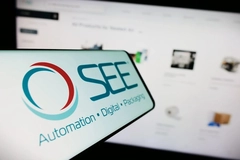Snack packaging: Recyclable claims and consumer convenience lead industry trends

Customer demand for snack packaging has evolved significantly over the past few years. There is a growing preference for sustainable packaging solutions as consumers become more environmentally conscious, according to Jörg Sabo, global marketing and innovation director at Greiner Packaging.
Greiner produces rigid plastic packaging solutions, and protecting products such as cups, tubs, lids, bottles, containers and trays. Greiner also provides integrated solutions, such as lids with attached cutlery options, designed to meet manufacturers’ needs.
Rigid plastic packaging allows snack manufacturers to position their products attractively at the point of sale.
“The durability and clarity of our packaging enhance product visibility and appeal, making it easier to capture consumer attention. The ability to mold plastic into various shapes and sizes results in innovative designs that stand out on shelves, while customizable vibrant prints and labels further enhance marketing appeal,” Sabo tells Packaging Insights.
“Additionally, our packaging solutions offer robust protection during transportation and handling, minimizing damage and waste. This durability ensures that snacks remain intact and fresh, extending their shelf life and maintaining their quality. By preserving freshness, rigid plastic packaging helps reduce food waste, safeguarding quality and safety.”
Greiner’s packaging is suitable for various snacks, including chips, nuts, candy and dried fruits. It is tailored to meet the specific needs of each product type. “We are dedicated to continuing our innovation journey to provide the best possible solutions for our customers and end consumers, combining sustainability, convenience and product protection,” he adds.
Innova Market Insights identifies nuts and seeds as the leading subcategory in snacks launches between July 2019–June 2024 , but popcorn grew the fastest. Meanwhile, Asia leads in snack pack innovations with the highest NPD globally.
In the US, dried snacks and gummies food brand KYSU introduced airtight, recyclable and reusable paper packaging made from recycled materials across its 80 products.
Regulation-compliant snack packs
 Greiner Packaging’s K3 r100 cup (Image credit: Greiner Packaging).Sabo says Greiner innovates according to customer needs, regulatory compliance and environmental sustainability.
Greiner Packaging’s K3 r100 cup (Image credit: Greiner Packaging).Sabo says Greiner innovates according to customer needs, regulatory compliance and environmental sustainability.
“With PPWR [the Packaging and Packaging Waste Regulation] compliance as a primary concern for our customers, Greiner is dedicated to providing sustainable, high-quality solutions that address this priority.”
An example of Greiner’s packaging developments is its K3 r100 cup. “This advanced packaging technology features a self-separating design, allowing the cardboard wrap and plastic cup to detach independently during waste disposal,” explains Sabo.
The design ensures up to 98% recyclability without requiring consumers to separate the components, contributing to better waste management.
“To further enhance the sustainability of the K3 r100 cup, we incorporate rPET (recycled PET) in its production,” says Sabo.
“rPET is particularly significant because it is the only post-consumer mechanically recycled plastic approved by the European Food Safety Authority (EFSA) for food contact applications. This makes it ideal for use in the food sector, where compliance with stringent food safety standards is crucial.”
Greiner’s use of rPET aligns seamlessly with the goals of the Packaging and Packaging Waste Regulation (PPWR), which aims to improve the recyclability of packaging and reduce waste.
“By integrating up to 100% recycled content into our K3 r100 cup, we amplify its environmental benefits. The combination of rPET and the K3 r100’s innovative design reduces overall plastic usage (especially the usage of virgin plastic material), lowers CO2 emissions and maintains high-quality standards suitable for food packaging,” says Sabo.
In other plastic-based snack packaging news, Amcor and Lorenz Snacks launched recycle-ready packaging for the snack manufacturer’s Lentil Coated Peanuts product. The packs are certified for recyclability by cyclos-HTP in the countries where PE or PP recycling streams exist.
Recyclable and convenient
Innova Market Insights has observed a 3% growth in global snacks launched from July 2019 to June 2024. While half of the snack launches were packed in flat pouches, tube emerged as the fastest-growing format. Meanwhile, Recyclable was the leading sustainability claim for snack launches.
Greiner identifies advances in plastic recycling technologies to facilitate the recycling of rigid plastic packaging, addressing environmental concerns and appealing to eco-conscious consumers. “By preserving freshness and extending shelf life, rigid plastic packaging also helps reduce food waste,” says Sabo.
“Additionally, the convenience factor is more critical than ever, with a demand for resealable, easy-to-open, and portion-controlled packaging. Rigid plastic packaging’s portability and resealable features cater to on-the-go snacking and ensure snacks remain fresh over multiple sittings.”
“For example, resealable tubs for snacks like nuts and dried fruits make it easy for consumers to enjoy their snacks without worrying about spills or losing freshness. Many rigid plastic packages are designed for single-serve portions, meeting the increasing demand for portion control. Greiner’s rigid plastic solutions align well with these trends, providing durable and eco-friendly options that meet these evolving needs.”
Sabo says Greiner’s R&D team continually explores new materials and technologies to enhance our rigid plastic packaging solutions.
“We are strongly emphasizing sustainability by developing packaging that minimizes environmental impact. This includes initiatives to improve recyclability and the use of more eco-friendly and recycled materials, ensuring our packaging solutions contribute to a more sustainable future while maintaining the highest standards of performance,” he says.











